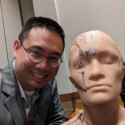With each day that passes, I find myself reflecting more and more upon the rigors of residency. Even now – a scant two years removed – as a newly minted attending after a one-year fellowship, I am constantly reminded of the many lessons learned from those days. Sure, lessons like “never stand square in front of a patient when checking patellar reflexes” were easy to learn. Others were less obvious and would come from the least expected places.
My residency program was a small but mighty one, which meant that whoever was on overnight was the only in-house neurologist on duty. Stroke codes, consults, admissions, floor coverage, neuro ICU – all manned by one resident armed with little more than a reflex hammer, a pen light, an underused stethoscope, and an overactive pager. Most nights would be a never-ending grind of stroke codes (ranging from requiring acute intervention to having a better NIH stroke scale than me), consults (both urgent and “This could've waited until morning”), and floor pages (anything from an acute change in mental status to a stat dose of docusate).
But some nights, rare as they were, the pager would be so silent, I’d need to do a battery check. The ED would be so quiet, I thought they’d lit up a neon "Closed" sign at the entrance. It was as if everyone in the catchment area agreed to wait for another time to have a stroke. On those shifts, the eerie calm of the hospital was unlike anything else I’ve ever experienced. By their very nature, however, those wonderful nights can only exist in hindsight. I could never celebrate too early, or utter that dreaded “Q” word, lest the stroke gods hear and bless me with a tissue plasminogen activator candidate. It was only after the morning shift had arrived, sign out was given, and I’d pass that hot potato pager to the next poor sap in line, would I be able to exhale and recognize that silent night for what it was. Yes, the vast majority of times the serenity was upended violently, like the sound a tree falling down in a forest makes with or without anyone around to hear it. But in those few, rare nights, the zen-like calm continued until the day team relieved me, allowing me to sleep through the day and repeat it all again in a few short hours. Only now do I realize what I truly learned from those shifts.
On those lucky nights, I'd spend most of my time alone in the call room, accompanied only by the deafening silence of a hallway of sleeping patients and the flickering glow of the broken television. Looking back, I can remember feeling a paradoxical tranquility that I had never felt prior and will likely never feel again. The welcoming sound of the pager's silence was juxtaposed against the ever-looming threat that the night could take a turn for the worse at any second. One could not exist without the other. The centered peacefulness existed in the negative space of the frenzied chaos. The serenity existed not in spite of the chaos, but as a result of it. Knowing that I was carrying a live beeping grenade at the hip made me appreciate every fleeting moment of quietude. I learned to soak in every microsecond of silence I was given. I taught myself to appreciate not just what was there, but to also appreciate what was not there; to be grateful for both sides of existence. I was able to be present in my own life in a way I had never been before. In the stillness of my mind, the stiff bed and scratchy sheets felt like a bed fit for a king. The graham crackers stolen from the pantry; a feast.
I learned not to wait until after the fact to appreciate things. I was able to carry those lessons forward and feel glimpses of that peacefulness even during the busier nights. In between each stroke code, each consult, each admission, I could bring back that tranquility, if only for a glimpse. And now, with residency long behind me, I still hold close to my heart this mantra to live by: When life grants you a momentary pause from the rigors of your busy day – savor it. Do not ask for more, do not expect the momentum to carry forward – accept it as the fleeting gift that it is. Silence is still a rarity these days, the shrill of the pager replaced by my busy outpatient practice or the cries of my young children at home. However, in those fleeting moments of respite, I can still feel the zen-like calm of the call room, soaking in the unknown quantum of time that I have left to be in total, complete, and utter peace.
What have you learned on call? Share in the comments.
Christopher Bondoc, MD is a neurologist with specialization in headache and facial pain disorders practicing at True North Neurology in Long Island, NY. When not in clinic, he can be seen with his ever expanding comic book collection, taking care of his twin boys, spending time with his beautiful wife, and realizing that he probably should've mentioned the beautiful wife and twins part first. To those interested, his generally neglected Twitter filled with dad jokes and Neurology article retweets can be seen at @the_bondoctor.
Image by GoodStudio / Shutterstock






